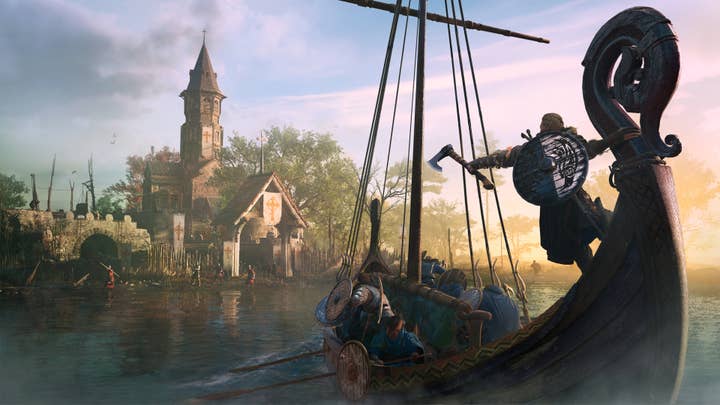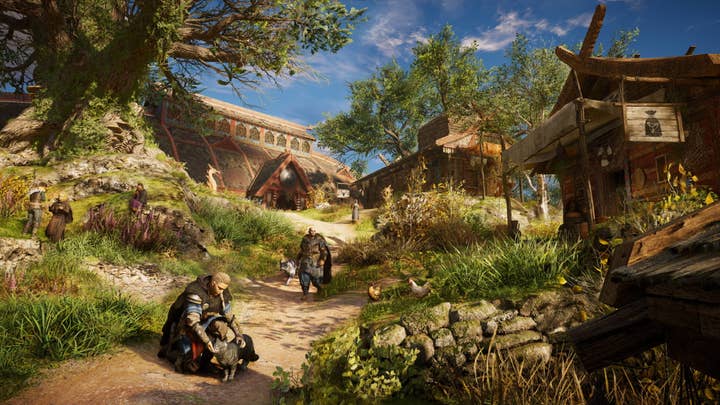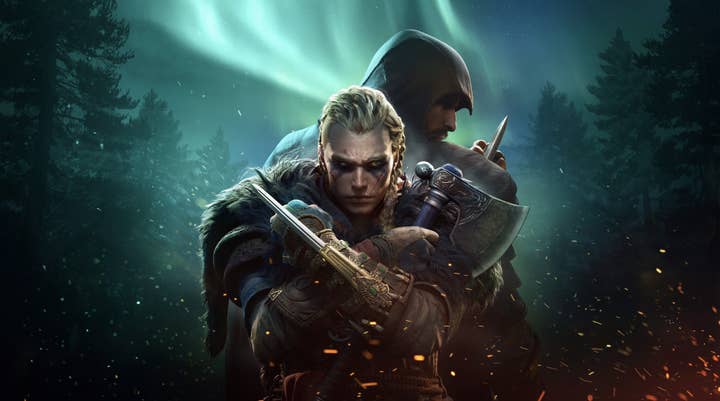Assassin's Creed Valhalla | Critical Consensus
Critics agree that Valhalla is one of the very best Assassin's Creed games, but its underlying themes are tainted by Ubisoft's year of scandal
An important truth about AAA games publishing can be gathered from the number of reviews that welcome Assassin's Creed Valhalla like a long-lost friend. Valhalla, they exclaim, is the first Assassin's Creed game in two (count 'em) years -- a blink of an eye for most creative endeavours, but an eternity in the hyper-regular release schedule of Ubisoft's venerable series.
Traditionally, whenever annualised franchises are given a 'gap year', it is in the name of innovation or renewal. With Valhalla, which launches on the same day as Xbox Series X|S, the anticipation of something that feels legitimately 'new' is all the greater. Indeed, with no major first-party titles from Microsoft itself, there's a solid argument for this being the single biggest game on the next-gen systems -- a situation that arguably says more about Microsoft's planning than it does about Valhalla itself.
It may not be a vision of the future, perhaps, but critics are largely united in the sense that Valhalla among the very best Assassin's Creed games -- one that builds on the RPG leanings of Origins and Odyssey, but implements a structure that manages to rein in the unwieldy sprawl of those two games.
Kotaku's Zack Zweizen attributes this tighter, more disciplined experience to Valhalla's premise, which puts players in the furry boots of Eivor, a Viking who flees Norway and its overbearing king to settle new land in 12th Century England.
"Valhalla has more structure than previous games, which sometimes meandered for hours before finding the plot again"
Kotaku
"This setup gives all of Valhalla a compelling, consistent sense of purpose and momentum -- in not only the main narrative, but also the gameplay and progression" Zweizen says. "It gives Valhalla more structure than previous Assassin's Creed games, which sometimes meandered for hours before finding the plot again. In Valhalla, nearly everything you do feeds into this narrative of exploring, conquering and building allies with other kingdoms."
The game world of Valhalla is divided up into "Kingdoms," each of which has a unique storyline to follow as Eivor attempts to win favour with or overthrow its ruling powers -- ultimately leading to an alliance with Eivor's growing clan.
"Each kingdom took me two to four hours to complete and felt like a season of a TV show," Zweizen continues. "Kingdoms are separate from the main overarching plot of Valhalla, which involves Assassins, relics, secrets and powerful enemies hiding in the shadows. But they still move Eivor and your clan's story forward. And like a good TV show, these seasons regularly end with a narrative climax that feels satisfying."
This kind of side content has occasionally been a weakness in previous installments in the Assassin's Creed series -- Ubisoft's evident desire for scale and scope often prioritising quantity over quality. While Valhalla is still a big game -- with a relatively direct playthrough likely to need a few dozen hours -- Kotaku's Zweizen is not alone in feeling that Ubisoft has found smarter ways to make that content feel less like clutter.

"When I climb to the top of a cliff, statue, or castle in Valhalla and cast my gaze to the horizon as I have hundreds of times in other Ubisoft games, the map doesn't fill up with curiosities as it has in the past," says Vice Games' Matthew Gault.
"Instead of distinct markers, I'm given dots in three different colors. Yellow for wealth, white for artifacts, and blue for mysteries. These points of light on the horizon only get specific when I got close to them. A yellow dot became a new item hidden in a church or precious resources locked away in a monastery. Mysteries could be a side quest or a literal mushroom trip. The artifacts might be the page from a saga or a new tattoo or haircut for Evior.
"Synchronizing all the points of a map won't unlock all these points on the map either, Valhalla pushes you to get out in the world and explore just a little more than I was used to in an Assassin's Creed. And there's no minimap, so my eyes were constantly on the screen instead of buried in the HUD.
"Valhalla pushes you to get out in the world and explore just a little more than I was used to in an Assassin's Creed"
Vice Games
"Fundamentally, it's still an Assassin's Creed game. There's still a big map with stuff to do but by changing the way I discovered those points of interest on the map, by making them a bit more of a mystery, it made me enjoy the rote act of discovery just a little more."
Indeed, the difference between Valhalla's handful of 7 out of 10 reviews and those with a higher score appears to correlate to the individual critic's fondness for the series' formula. While it took an extra year and will debut on a 'next-gen' platform, this is still an Assassin's Creed game -- very much a mix of the ideas and concepts in Origins and Odyssey, with the same lavish attention to historical detail, but with a few common sense fixes for lingering problems.
One of Vahalla's areas of improvement is combat, which PC Gamer's Steven Messner praised mightily in his 92% review. The latest Assassin's Creed is vast and not without flaws, he said, but the moment-to-moment thrill of fighting makes up for its handful of frustrations.
"The system is similar to Odyssey in a lot of ways, but much more satisfying," Messner said. "For example, I can now dual-wield any two weapons, changing my combat style while also giving me access to special moves unique to my offhand weapon.
"The combat system is similar to Odyssey in a lot of ways, but much more satisfying"
PC Gamer
"... Instead of sporting a measly axe, I'm holding a two-handed battle axe in one hand and a massive spear in the other -- or I can hold two spears and be extra stabby, or two shields and be extra shieldy. It's so much fun discovering all of these combinations. And no matter what weapons I choose, I know I'm going to be both horrified and amazed at just how artfully Eivor can use them to separate people from their limbs."
The preponderance of what Messner describes as "gnarly" ways to dismember your foes speaks to a fundamental shift in the series since the earliest games. Indeed, if all assassins were as brazen as Eivor, Kassandra or Bayek in their approach to killing, one suspects the brotherhood would have fallen to the Templars a few days after getting started. As Messner points out, the stealth mechanics on which the franchise was first built are "quickly becoming the most antiquated part of Assassin's Creed."
Another outdated aspect of the franchise was the dominance of male leading characters, and the tendency for Ubisoft staff to end up with feet firmly in mouths whenever they were asked to explain why. Over time, female characters have played increasingly important roles in the games -- the 2012 PS Vita game Liberation had a female protagonist, for example -- but it wasn't until Odyssey in 2018 that the mainline console games offered the choice to play as a woman from beginning to end. Indeed, in the eyes of many, Odyssey's Kassandra is perhaps the best main character in the history of the franchise.

Valhalla offers a similar choice, but with a third option that caused a great deal of confusion when it was first revealed. The player can elect to play Eivor as female or male, or to let the game switch between the two at specific points (the game's default option). For Polygon's Nicole Carpenter, this was a jarring addition that raised uncomfortable questions about Ubisoft's attitude towards its female characters.
"This happens for mysterious reasons that are explained by the modern-world framing device, which is a confusing storyline about how modern-day people access historical memories from people of the past," Carpenter says. "... To me, the modern-day framing is confusing and I like to ignore it. Moving between those two worlds has always been jarring, so there was no way I was going to let any part of that -- the Animus -- chose my character for me.
"Ubisoft has said that both genders are considered 'canon' for the game, because of the choice option. But because there is really no difference between the options -- aside from looks and voice -- it feels hollow, especially given reports of how female Assassin's Creed characters have routinely been sidelined as main protagonists."
"It's impossible for me to play this video game, let alone review it, without considering the company culture at Ubisoft"
Polygon
In her discussion of the importance of gender in Assassin's Creed, Carpenter also mentioned the reports that surfaced this year about Ubisoft's work culture -- which included numerous allegations of misconduct and assault, not least against Valhalla creative director Ashfraf Ismail, who was subsequently fired.
"It's impossible for me to play this video game, let alone review it, without considering the environment and company culture at Ubisoft, especially given how Ubisoft has apparently perceived its female characters, a perception that goes back far into the franchise's history," Carpenter said.
Many other critics did the same, devoting significant time and space to exploring what it means to endorse a Ubisoft game in light of this year's revelations. Vice's Matthew Gault acknowledged Valhalla as "a beautiful game," but its "message of good governance" rings hollow when "the company that produced it fostered abusive leaders for years."
"It's a very good Assassin's Creed game, from a company and a culture that's rightly in disgrace," Gault said, in a striking final sentence of his review..
Eurogamer's Tom Phillips is as admiring of Valhalla as both Carpenter and Gault, but when reflecting on the context in which it was made, he emphasised the sheer number of people who worked honestly and tirelessly to bring it to life. Ubisoft may be rightly in disgrace, but their contributions should not be overlooked.
"Valhalla is the work of many hundreds of people -- not just its former creative director who, as far as I can tell, no longer holds a place in Valhalla's credits. It is the work of many of the same people who created Origins, and who wanted Aya to have a more prominent role there, not just the studio heads and editorial team who thought otherwise. And it is the work of developers who recently reached out to the ACSisterhood fan initiative, to include their community within the final game.
"Just over two years ago, I reviewed Assassin's Creed Odyssey and recommended it thoroughly, while still looking forward to polishing off its remaining parts. Two years on, I feel like I'm at a similar point with Valhalla.... It is a Viking saga which does at times struggle a little in reaching its destiny, and in its efforts to evolve the series has made some sacrifices to tell a stronger overall story.
"But it wins through, in the end quite easily, as it continues the Assassin's Creed saga for a new generation."

